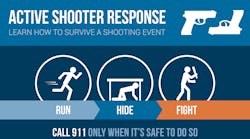Analysis & Commentary
In both fact and perception, the United States has become a much more dangerous place to live and work than it was just a handful of years ago. The danger extends beyond the street to the workplace as well, and how to protect your workforce is a question almost all employers have to ask themselves in the current environment.
From 1992-2019, workplace violence has killed almost 18,000 people, according to a recent study conducted by NIOSH, the Bureau of Justice Statistics and the Bureau of Labor Statistics (which includes incidents that occurred outside the workplace but stemmed from work-related issues.)
While this is not a new problem, the current situation does represent a renewed challenge to employers because it has arisen following the widespread deterioration of mental and emotional health because of the COVID-19 lockdowns, and now heightened emotions erupting over political differences.
As of mid-September, there had been 508 mass shootings in the United States this year, resulting in 545 fatalities and 2,089 wounded. Murder rates in a number of cities have hit record levels, as have the incidents of assault and injuries resulting from street violence. It is not surprising that the soaring rise in the crime rate has risen to the level of a top public concern and campaign issue.
Many of these shootings involved workplace violence, observes attorney Paige S. Newman of the Akerman law firm. She says the rise in workplace violence, and violence in general, should prompt employers to consider what they can and should do to protect their employees, customers and business. “It is especially important to do so now, as more and more employers are requiring their employees to return to work in person following the pandemic,” Newman stresses.
In fact, the polarization of the American political scene has visited some confusion on the advice she gives to employers about the steps they should take to protect their employees against potential violence. The most notable of these is her recommendation that employers ban guns from the workplace.
Gun rights advocates have made the point that in a number of cases, shooters with murderous intent were stopped by civilians who had guns nearby, and simply declaring areas to be gun-free zones may have actually turned those sites into targets for some killers who were looking for a high body count. You may agree or disagree with this viewpoint, but it is one that is held by large numbers of Americans.
However, Newman recommends that employers make sure their employee handbook has as comprehensive an anti-violence policy that can be consistent with state law that includes a strong ban on guns on the worksite. She adds that, wherever possible, the ban should extend to related sites such as the parking lot or outdoor break areas. Of course, changes in some state laws make this impossible to do, which she recognizes.
For example, Florida law allows employees to keep weapons in their locked vehicles in the employer’s parking lot and prohibits employers from interfering with employees’ and customers’ rights to do so. In Texas, people may carry a gun in most public places—even those who are not licensed to carry. (The state imposes different rules for unlicensed carry and licensed carry near schools and colleges.)
Private businesses are generally permitted to choose whether to prohibit unlicensed carry, open carry by license holders, and/or concealed carry by license holders, she notes. “Employers should determine whether their state has any laws governing weapons in the workplace and employers’ regulation of same, and ensure that their anti-violence policies are as thorough as possible within the constraints of the law.”
Active Shooter Training
Newman says a company’s anti-violence policy also should include information for employees on how to report concerns about other employees’ behavior in the workplace, including threats and acts of violence. Also consider implementing a badge security system so that employees must show and/or scan their ID each day to access the building.
She goes to the length of suggesting that employers consider implementing a system through which employees and their personal belongings (e.g., purses, briefcases, bags) pass through a metal detector to enter the premises, to ensure that weapons are not brought onto the premises.
However, Newman warns employers with unionized worksites that they must pay special attention to their duty to give the union notice and an opportunity to bargain before implementing safety measures that would affect terms and conditions of employment.
Given the high visibility of mass shootings over the past year, it is important to make sure that employees know what to do if such a situation arises in the workplace. Employees should be trained on how to respond to events involving violence, including the locations of emergency exits, how to lead others off the premises in emergency situations, and how to report any suspicious behavior.
Consider implementing an annual active shooter training, which in some situations can be provided by your local police department, Newman advises. “Employers should also consider investing in safety equipment such as security cameras, bulletproof windows, office doors that lock from the inside, and, depending on the size of the premises, potentially hiring security guards,” she adds.
Changes in federal, state and some local laws also have reshaped how employers can pursue another one of Newman’s recommendations: implementing a pre-hire background check policy as part of their anti-violence initiatives. In doing so, employers might try to find out about the candidate’s work history, education, criminal record, financial history, medical history, or their use of social media.
Except for certain restrictions related to medical and genetic information, it is not unlawful to seek such information, she explains. “However, in doing so, employers must comply with federal and state laws that prohibit discrimination, and ensure that the background check is properly conducted or the information obtained is not used in a manner that denies equal employment opportunity to anyone on a protected basis, by intent or by unlawful disparate impact.”
When you conduct a background check through an outside company you still must comply with the Fair Credit Reporting Act (FCRA). Advise applicants that they must submit to a background check before they are employed. “Conducted properly, background checks can provide important protections to employers,” Newman points out.
In states like Florida, employers are entitled to qualified immunity from lawsuits for death or injuries caused by an employee to a third person if the employer conducts a background check before hiring that employee, and the investigation did not reveal any information that reasonably demonstrated the unsuitability of the candidate.

